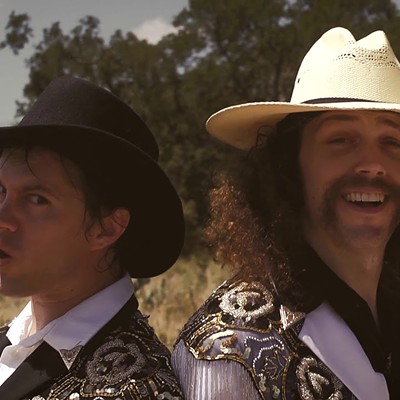Then, over the course of two EPs and this year's full-length debut CD, Reflector, its music evolved, but not in the direction you'd expect. It's become simpler, said bassist-drummer-vocalist Bee Elvy.
"Our (musical) language has mutated in a way. We started out wanting to make really simple music that was really direct. And I think now, we've figured out a way to make the songs even more simple," Elvy said.
"Our new songs are only one or two parts. They don't have so much as choruses, but the verses are choruses in themselves."
Elvy was enjoying a welcome afternoon off, wandering around San Francisco while talking on his cell phone. The members of Antelope were on a three-week American tour after four weeks in Europe and had recently escaped the brutal weather of an early winter in the Midwest.
The band members--Elvy is joined by bassist-drummer-vocalist Mike Andre and guitarist-vocalist Justin Moyer--split up the songwriting duties. Each takes the lead vocal part on tunes he writes, with Elvy and Andre opting for sweet, high melodies, and Moyer's singing voice--on album standouts such as "Justin Jesus" and "The Demon"--coming on with a bit more snarl and swagger.
Elvy and Andre, both now 33, previously were members of the band Vertebrates, while Moyer, who is 30, played with both El Guapo and Supersystem before devoting himself full-time to Antelope.
An elegant minimalism is one of the most attractive things about Antelope's music, which may remind some listeners of early post-punk bands that experimented with a quiet, faux-primitivism.
Simple, splintery guitar melodies weave in and out of fluid, contrapuntal bass lines, meshing with clock-like drumwork. The result is an angular funkiness that might be called mechanical if it didn't leave lots of human breathing room in the arrangements.
It's that simplicity that Elvy said gets Antelope "into trouble sometimes."
"People find it to be repetitive, or they say it doesn't have enough in it to make it interesting. But we are constantly trying to find new ways to (make) meditative or repetitive music interesting, and to make our stuff still be simple and stripped down. We feel challenged to make music that is essential. You listen to old Delta blues; sometimes, it only has one part, but people don't criticize it for being simple."
Naturally, Antelope keeps most of its songs short, with few breaking the three-minute mark.
"I would like to maybe someday make a long song, but we are very drawn to that sort of idea about a song being boiled down to its essentiality somehow," Elvy said. "Once we play these main musical themes or phrases a couple of times, they sort of decide their own natural course and conclusion.
"We're also playing in a punk or indie-rock arrangement, and we're definitely of that generation and attention span. We all did grow up also listening to hard-core punk; something of that shortness is appealing."
Between them, the members of Antelope claim musical and lyrical influences as varied as Japanese haiku, Spanish art, Tibetan mythology, West African pygmy music and minimalist composer John Adams.
"All of us are real music nerds. I grew up classically trained as a pianist," Elvy said.
"Mike grew up in playing in orchestras. Justin did a lot of singing in various choirs and choruses and also did some drama. But we all grew up listening to everything from hip-hop to classical."
Coming from Washington, D.C., the members of Antelope are conscious of being part of an independent-minded musical community that encourages creative freedom, Elvy said.
"We are obviously part of and made from that environment. So many of my various ideological and musical influences come from that place and the environment. It's kind of nice to be part of such a positive environment, even as there are various movements that go on within it."
It makes sense, then, that Antelope would be aligned with the D.C. independent label Dischord Records, which released Reflector in March. The record was recorded and mixed by Ian MacKaye, one of the Dischord founders and an influential music visionary for his work with Minor Threat and Fugazi.
Elvy said it was "super-great" to work with MacKaye, whom he and the other Antelope members look up to.
MacKaye "involves himself only with stuff that he likes. That's pretty much the way he works," Elvy said. "He's kind of a mentor to us in a lot of ways. Growing up, we really admired his bands and how he's set up the label. It's sort of a new and interesting model, and he's a new kind of businessman in the record industry."
Antelope isn't interested in "graduating" from Dischord to a bigger company, Elvy said
"We could probably be on a different label that had a lot of money for promotion and advertising, and maybe we'd be selling a lot more records. But something about (Dischord) feels so right; to be part of (that) collective and environment feels natural."
In its press information, Dischord calls Antelope's music meditative punk. In spite of the fact that "punk" is such a loaded word these days--maybe it always was--Elvy said he finds the band is relatively comfortable under that umbrella.
"Punk is OK for me as a label, in the old sense, in that it should mean something about creative freedom, regardless of the style you're using. ... Punk can mean so many different things, especially today. But punk is really a contradiction of the mainstream. Punk is an explosion of ideas."










